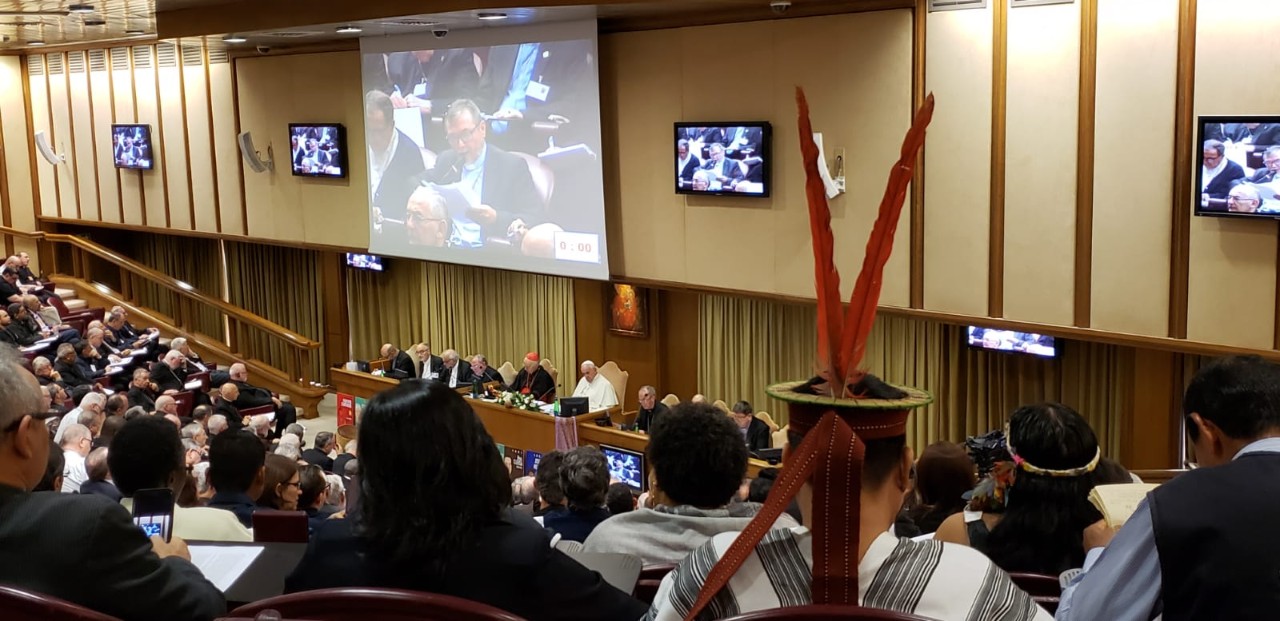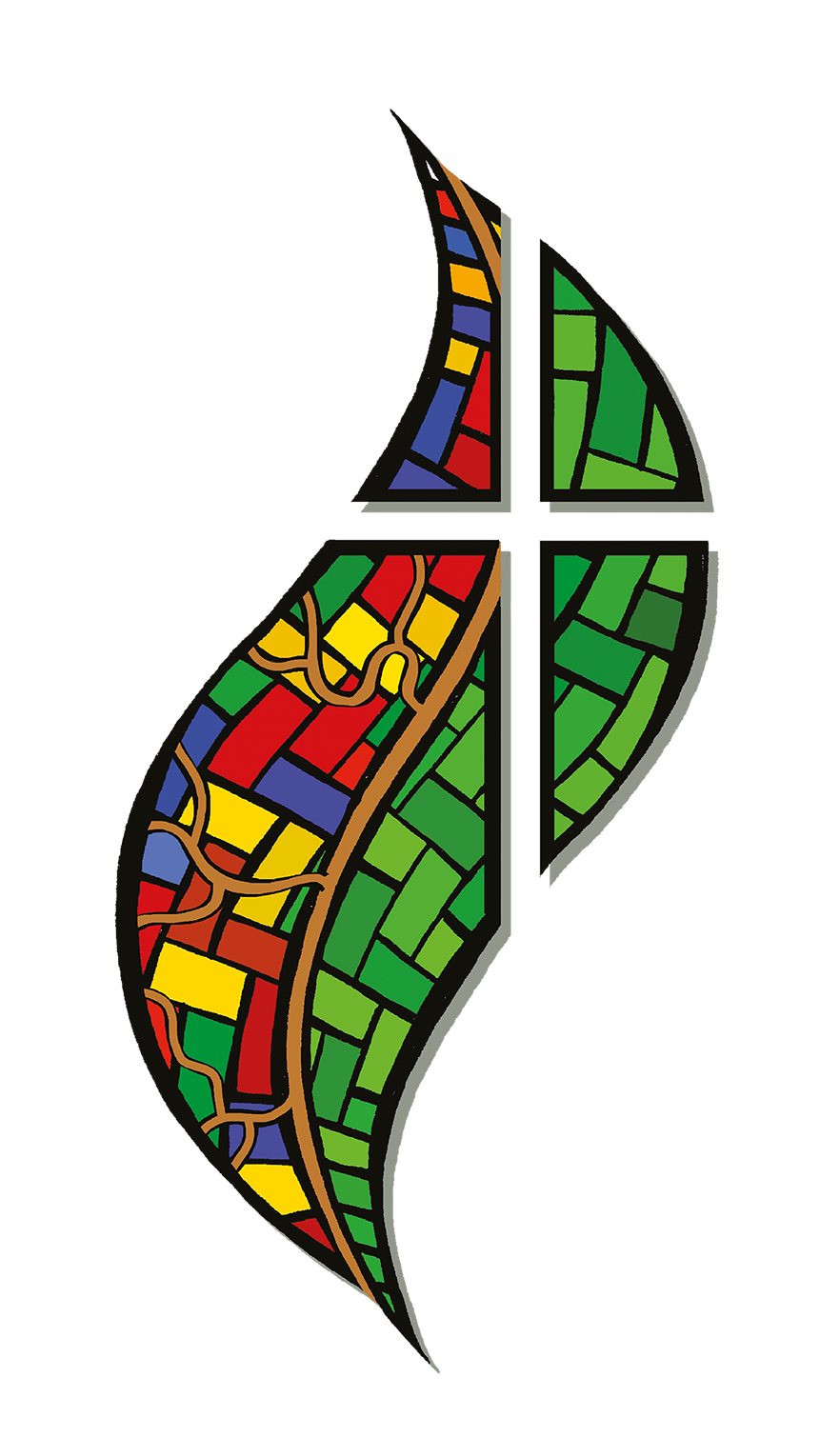7th General Congregation. Overview presented by Vatican News

7th General Congregation
Overview presented by Vatican News
#SinodoAmazonico. Integral education for an ‘ecological citizenship’
The Special Assembly for the Pan-Amazon Synod of Bishops continues this morning, Saturday 12th October in the presence of the Holy Father for the 7th General Congregation. 175 Synod Father are Present in the Synod Hall.
Vatican News – Città del Vaticano
Today the Church celebrates Our Lady of Aparecida in the Synod Hall with a hymn in honour of the Blessed Virgin Mary, Patroness of Brazil, and thus we entrust the work of the Synod to her begin the 7th General Congregation of the Synod on the Pan-Amazon Region. Today affords the Synod space to hear again the interventions of the Synod Father as well as Auditors. The themes examined are: integral education, instruments of integration and the promotion of the Amazonian people, sustainable development that serves equal access to information through interdisciplinary and trans-disciplinary methods, as well as, the movement away from a culture of waste to a culture of encounter. The work of educators is thus renewed by an evangelical perspective so that it is capable of this great challenge of education. From this reflection arises the urgency of an educational alliance, in an ecological perspective and an Amazonian hermeneutic so as to promote the ‘good life,’ ‘good cohabitation,’ and ‘good action.’
Ecological citizenship
The Amazon region is not only rich in biological diversity but also in cultural diversity. Today the community living in the Amazon recognises the threats of expansion and of a so-called ‘civilised world,’ which in reality aims at the exploitation of natural resources for the capitalisation of wealth. On the contrary, integral education proposes to re-establish the connection between humanity and the environment, forming individuals to be capable of caring for our common home, in the name of solidarity, from a communitarian consciousness of ‘ecological citizenship.’ Ecological integrity, to repeat, must become part of the way one lives in the Church for the world. The theme of the Encyclical, Laudato si, must be taken seriously, one repeats, whilst people point toward a stronger homogenisation, God desires a harmony of differences. It is for this reason that the Amazon serves as a virtuous model in as much as it represents unity in diversity through its ecological system and the people living there in the Amazon region. From this we repeat a no to homogenisation, which excludes or dominates the people of the Creator, in order that injustice and violence do not prevail, for example ‘land grabbing,’ or the degradation of protected marine zones.
The theme of work and the drama of trade
One intervention treats above all the interaction between ecology and work, two themes too often connected to technocratic and exploitative dynamics. On the contrary one is reminded of the necessity of promoting a theology of Creation so as to reconstruct a relationship that it is not predatory in regard to the environment. The theme of work is also developed. In one intervention the question of youth unemployment is raised. The first and most grave for of exclusion and disenfranchisement of youth is the alarming situation of slavery in different areas of the city. The drama of child labour is another tragedy. From these reflections arises the necessity of promoting workers’ rights relaunching a joint economy of local bio-economies and renewable energies. If all look at this priority it shall be a gain for the good of the general community. Another theme raised was that of human rights in all of its tragic aspects, especially, prostitution, forced labour, and organ harvesting. Treating the crimes against injured humanity, it is again affirmed in the Synod Hall, a new moral imperative, that must be united with an international legislative force, so as to liberate society from these crimes.
The role of women
Reflection returns to the role of women who are very active in the Amazonian communities sharing together with priests various pastoral responsibilities. The Synod Hall affirms that this serious question must be seriously studied avoiding a superficial evasion. For this intervention it is asked that women be considered on equal standing with the dignity of men in the field of non-ordained ministries, especially in the many female religious congregations which still provide true heroines for the Amazon and the birth of communities in diverse parts of the region. Various auditors reflect on the experiences of consecrated life in the Amazon and the need to promote indigenous vocations, recognising individual identity and a true enrichment of the Church’s spirituality. Again it is repeated the needs of the consecrated in the peripheries and the versatility of their work. Arising from this is the idea of a greater recognition and value of consecrated women so that they may no longer walk behind but rather, walk beside in a synodal ecclesial vision far from clericalism.
The question of vocations
As much as the theme of viri probati has been raised, the Synod Hall reflects on the reason why there is a lack of vocation and why the Church seems unable to reawaken vocation anew. An intervention proposes to make aware of the experiences of local, temporary ministers who are married men, provided that they are approved by the local ordinary and the local community. Another speaker suggested the institution of a Commission of the Pan-Amazon Region for the formation of future priests. This would take into account the financial difficulties of individual dioceses and the shortage of educators. Again the importance of the permanent diaconate is raised.
Migrants are not numbers
The Synod Fathers return to the question of migration. The Amazon in fact is amongst all of the regions of Latin America the most mobile, nationally and internationally. Central to this fact is the call not to consider the migrant as a mere sociological or political datum, but rather as a theological matter for the Church to reflect upon in favour of justice in the respect of human rights in the pursuit of a just and inclusive economic system. It was highlighted again in the Synod Hall the need for a pastoral attitude so that this work is not simply social but spiritual in such a way that promotes a true integration of migrants.
The missionary work of the Church and the challenge of Ecumenism
The Synod Hall reflected upon the missionary work of the Church in the Amazonian region where approximately 38 million people live, including groups of indigenous who live in voluntary isolation. The question was also raised of bringing to the region the Word of God through a language of love and prayer. To this end a testimony that is coherent, beautiful, and capable of attracting is called for. For the Church to ‘be on the move’, kerygmatic and a teacher of the faith, there is the recognition of the need for dialogue, appreciation of the values of different peoples, making it fecund in the cultures with an evangelical witness, so that it may not simply await projects, but rather a Person, namely, Jesus Christ. The mission of the Church tends toward Ecumenism so that it may together with other churches protect the environment, as well as the rights of indigenous people, not forgetting the place of dialogue.
The Auditors, the Amazon is not a commodity. No to colonialism
In closing the General Congregation, the voices of certain auditors were raised in the Synod Hall, delimiting the protection of the indigenous territories so that they are not expropriated and degraded in the name of mineral extraction activities or hydroelectric centres. The defence of the land is equivalent to the defence of life. Local governments often impose injustices in the face of native peoples, often discriminated or placed in ‘the shop window,’ not respecting as a living culture the various customs, languages and traditions. Also the international community must intervene concretely to end the crimes perpetrated against the peoples native to the Amazon, so that the region is not treated as a commodity. The care of our common home is not an object of propaganda or profit, but rather a question of safeguarding creation, far away from ‘economic colonialism,’ or the imposition of modernising society and culture in the territory so as to promote models of development foreign to their cultures. From this the idea is proposed, that local churches, create an aid fund, creating initiatives of ethno-ecology, agro-ecology, and food safety, initiatives departing from an Amazonian logic.




